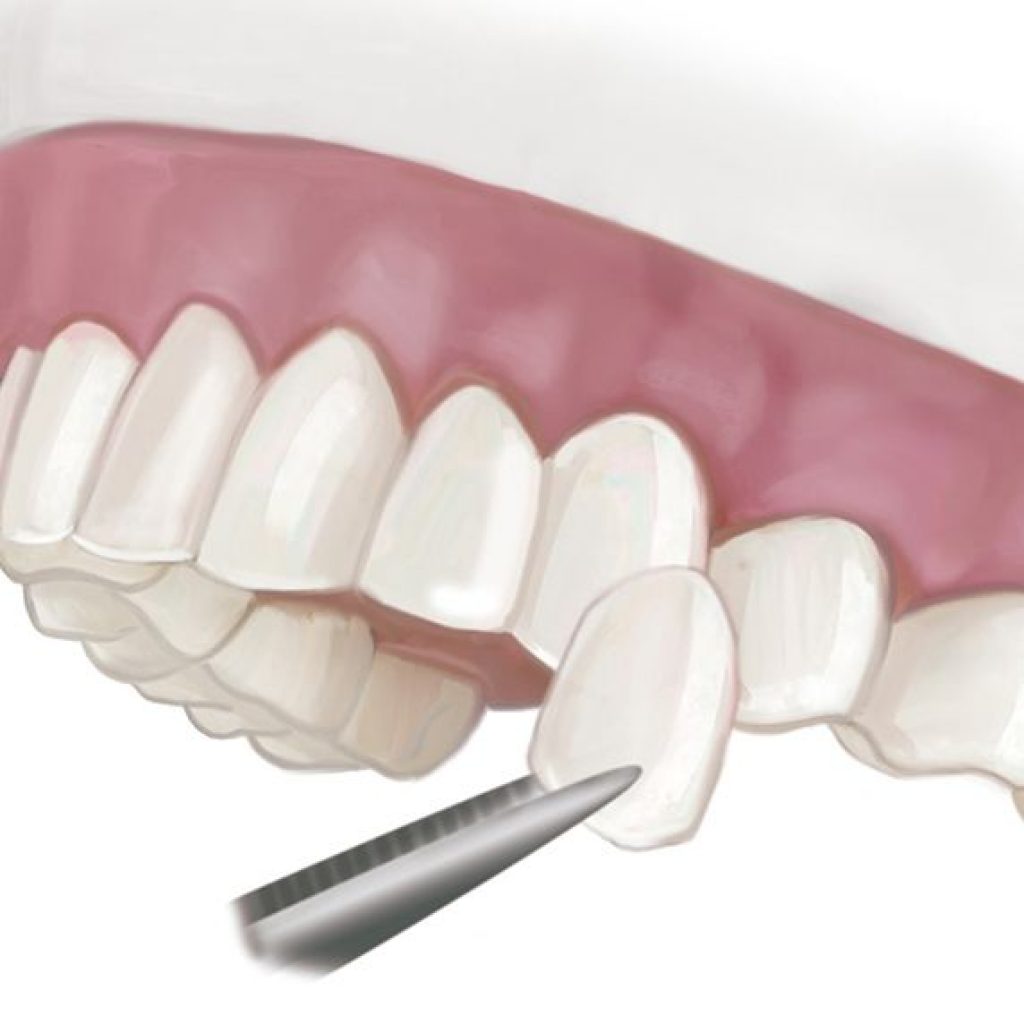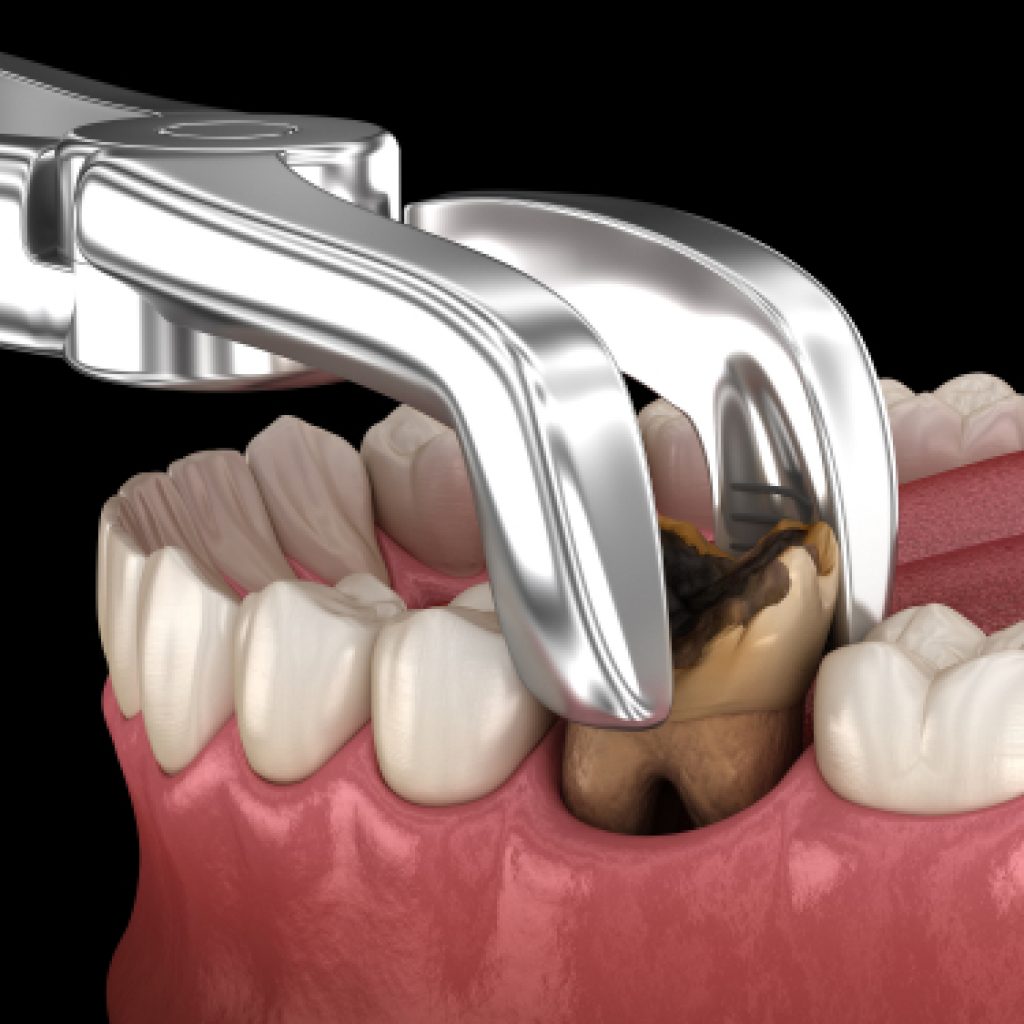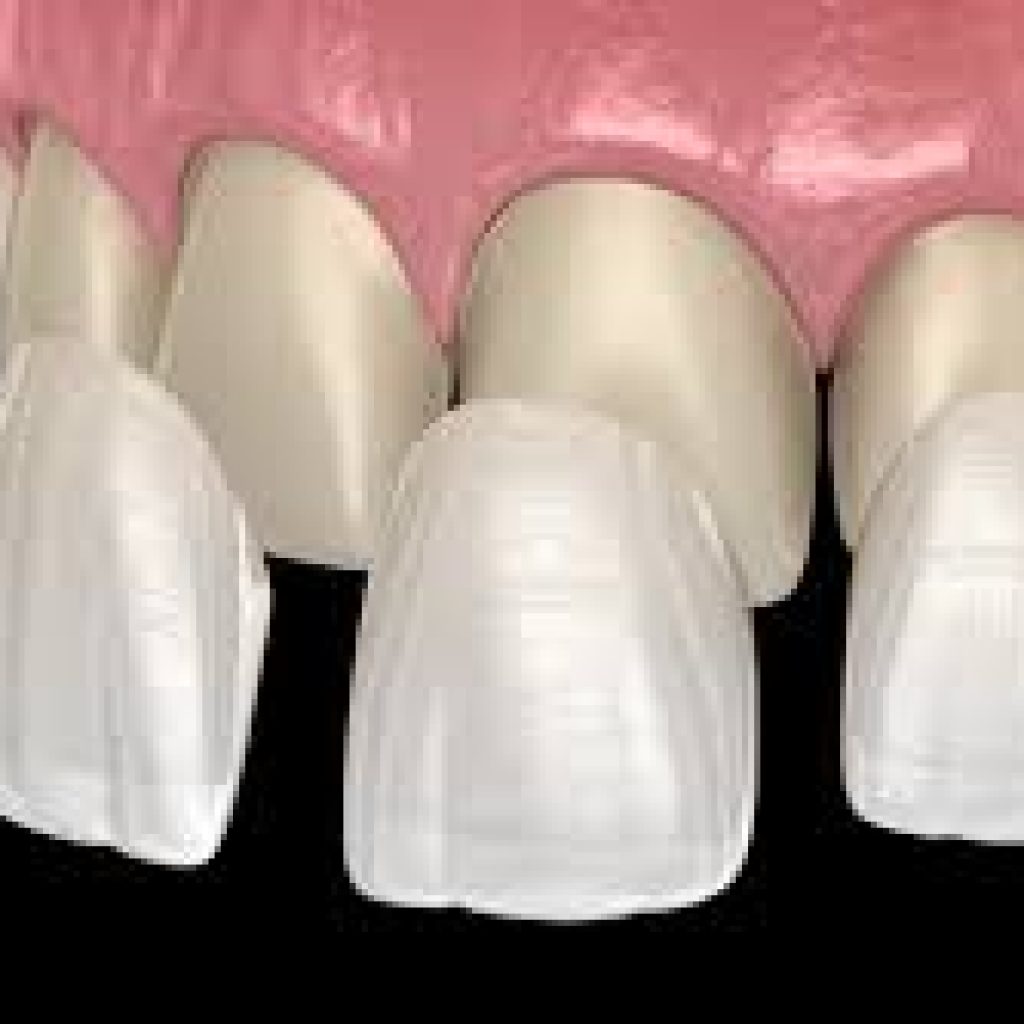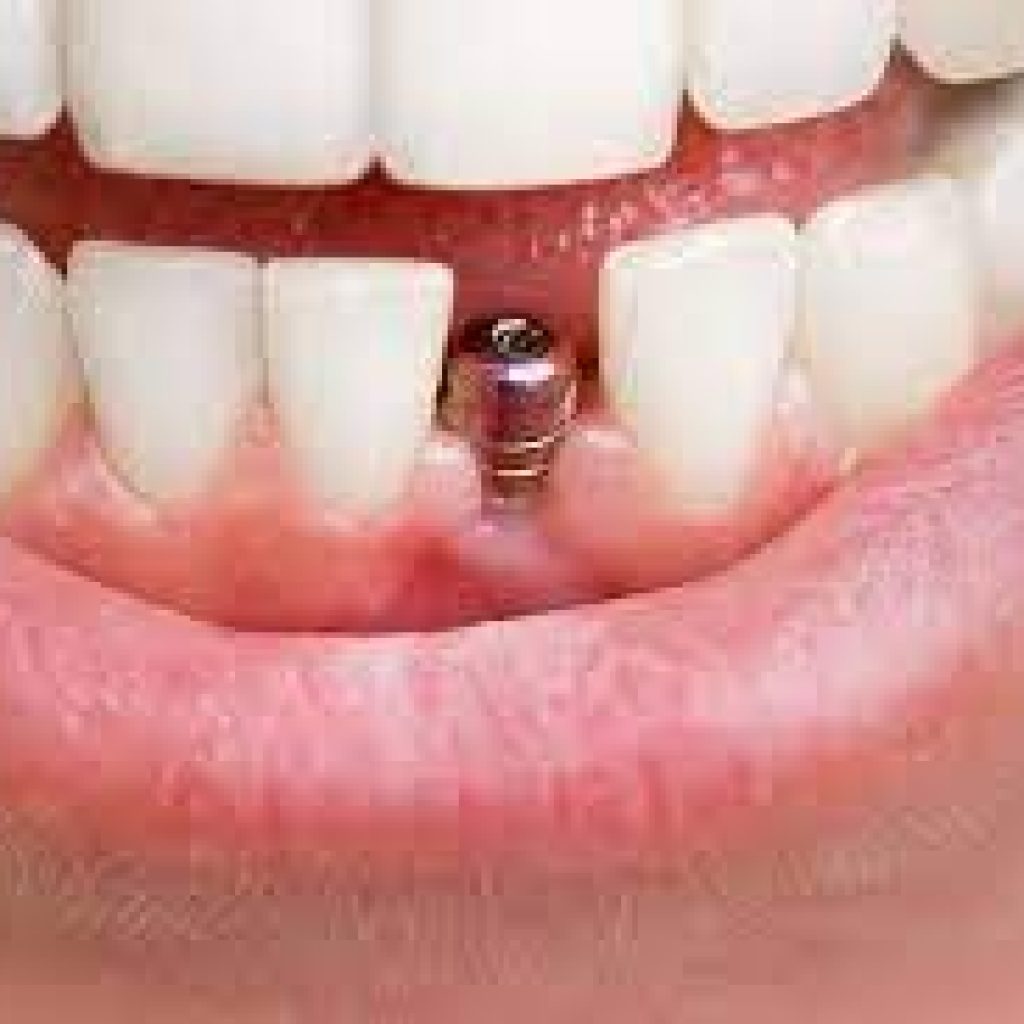
Cosmetic dentistry as an industry has evolved a lot over the last two decades. Even if you have had cosmetic dental work done in the last couple of years, you might have a question about a new treatment or procedure you just recently heard about. I would say one of the most frequently asked questions we receive from patients in our office is… “Do cosmetic veneers damage your teeth?”
Porcelain veneers believe it or not do ruin or damage your teeth. Our cosmetic dentists here at San Marcos Dental Center, take a lot of pride in equipping each patient with the information or knowledge needed to create the best treatment plan.
What are cosmetic veneers?
Before discussing the specific details of how custom veneers can affect your health long-term or other teeth. We thought it might be helpful to first have a concept or grasp of what custom veneers are. Cosmetic veneers are simply just thin pieces of porcelain that are custom shaped to go over the front of our existing teeth. We can shape or color the veneers and tailor them according to your specifications and the desired result. Custom veneers are not full proof and need to typically be replaced every ten years with a new set. The feeling of a perfect smile is priceless as a patient, with pearly white teeth that are functional and designed to last.
How do custom veneers affect your teeth?
Custom veneers will not hurt or damage in any way as long as you see a qualified or licensed dentist. The first step of the process is to take a few initial x-rays to examine how healthy your teeth are and to evaluate potential signs of decay. In most cases, we will have to treat your teeth before we begin your treatment. Once your teeth and gums are healthy, we will need to prep your teeth. To prep your custom veneers we start the whole process by removing a thin layer of your existing enamel from your teeth. Although this might sound barbaric or painful it’s not, because we will be bonding the veneers over your teeth. Your teeth will now have more protection than ever before and will not be susceptible to staining, unlike natural teeth. From there we add a special bonding cement to bond the veneers to your existing teeth. The bonding materials used are completely safe and will not damage your teeth. This rather simple dental procedure will give you a long-lasting and beautiful smile while protecting your teeth from stains.
Over the next decade, you will enjoy your new smile! Eventually, you will have to replace them with a new set to keep them looking amazing but regardless you have a solution that won’t hurt or damage your teeth! Your teeth will stay intact and safe under the protected custom veneers.
If you have any questions on custom veneers please contact San Marcos Dental Center today at 760.734.4311 to schedule a free consultation 🙂
Discover the Benefits of Dental Implants
Dental implants offer numerous benefits, including:
Seamless aesthetics – Dental implants are indistinguishable from your natural teeth, integrating with bone to become a permanent part of your smile.
Improved speech clarity – Ill-fitting dentures can lead to speech difficulties. Dental implants stay firmly in place, allowing clear and confident communication.
Increased comfort – As a fixed part of your mouth, implants remove the discomfort associated with removable dentures.
Effortless eating – Unlike dentures that can shift, dental implants let you enjoy your favorite foods without discomfort or fear of movement.
Enhanced self-confidence – Regain your smile and boost your self-esteem with dental implants.
Improved oral health – Implants don’t require altering adjacent teeth, preserving more of your natural teeth and promoting better oral health. They also facilitate easier cleaning between teeth.
Durability – Built to last, dental implants can endure for decades, and with proper care, might never need replacement.
Convenience – Forget the hassles of removable dentures. Dental implants offer a permanent solution without the need for adhesives or removal.
Thanks to advancements in dental implant technology, most patients are now candidates for this superior tooth replacement option. San Marcos Dental Center is pleased to provide a complimentary consultation to determine if dental implants are the right choice for you!

Cosmetic veneers can dramatically enhance your smile by correcting imperfections and turning flaws into a thing of the past. With diligent care and maintenance, cosmetic veneers can remain vibrant and strong for over a decade before needing replacement.
Durability of Cosmetic Veneers
The typical lifespan of cosmetic veneers averages around ten years. However, with attentive care and maintenance, this period can extend, potentially allowing your veneers to last up to 20 years. Ensuring that your cosmetic veneers are correctly applied from the outset can save future time and expenses. It’s crucial to collaborate with a trusted cosmetic dentist to guarantee your smile is exceptional from the beginning.
Extending the Life of Your Veneers
Even with the best intentions, failing to properly care for your teeth means your dental veneers might not endure as long as possible. To maximize the longevity of your investment, consider these guidelines:
Refrain From Using Teeth as Tools
Avoid using your teeth to open packages or chew on non-food items like pen caps or fingernails. Such habits can cause your veneers to chip or crack under pressure.
Steer Clear of Tobacco Products
Tobacco products can stain your teeth, and veneers are not immune. To maintain the brilliance of your white veneers, it’s best to avoid tobacco.
Limit Dark-Colored Foods and Drinks
Common culprits like red pasta sauce, berries, cola, coffee, tea, and wine can leave surface stains on your teeth. Moderation and rinsing with water after consuming these can help keep your smile bright.
Commit to Daily Flossing
Even with veneers, it’s essential to floss daily. Regular flossing maintains healthy gums and helps prevent diseases that could affect the fit of your veneers.
Protect Your Smile with a Mouthguard
For those active in sports or who grind their teeth at night, a dental guard is crucial to prevent damage to your veneers. A guard is an excellent way to maintain the condition of your veneers.
Select Appropriate Oral Hygiene Products
Using a soft-bristled toothbrush and non-abrasive toothpaste is key to cleaning your veneers gently. The right oral hygiene products can significantly extend the life of your veneers.

At San Marcos Dental Center, we are committed to delivering top-notch dental and surgical care to our patients. Often, individuals come to us on the recommendation of their general dentist for specific treatments, such as a tooth extraction. While preserving a tooth is always the preferred option, extractions are sometimes necessary to maintain the health of surrounding teeth and gums. Before proceeding with any extraction, our team at San Marcos Dental Center will thoroughly explain the process, post-operative care, and the six most common side effects you may experience.
1. Bleeding
Bleeding is expected after a tooth is removed, but forming a blood clot is crucial to halt it. We’ll have you bite down on a gauze pad for 30-45 minutes before you leave. Should bleeding persist, replace the gauze and continue to apply pressure for another half hour. This step might need to be repeated to ensure clot formation.
2. Swelling
Swelling around the mouth and cheeks is common following an extraction, typically peaking the day after the procedure. Ice packs can be effective in reducing this swelling.
3. Moderate Pain
Experiencing mild to moderate pain subsequent to an extraction is normal. Over-the-counter analgesics, such as paracetamol or ibuprofen, can alleviate discomfort. Adhere strictly to the dosage instructions, and if pain intensifies or persists, don’t hesitate to contact our office.
4. Soreness
Following a tooth extraction, it’s common to experience some soreness and tenderness in the mouth. We advise sticking to a soft diet post-procedure, including foods like soups, smoothies, scrambled eggs, mashed potatoes, soft-cooked vegetables, yogurt, and pasta to ease discomfort.
5. Rinse
Maintaining oral hygiene post-extraction is vital to prevent infection. You may gently brush your teeth on the day of the procedure. Starting the day after, rinse your mouth 5-6 times daily with warm salt water or a prescribed antiseptic rinse to aid healing and fend off infection.
Undergoing surgery can be a daunting experience, especially when it involves intricate procedures like dental implants, which necessitate surgical intervention on your jaw. It’s natural for individuals to feel anxious about the procedure and concerned about the potential discomfort it may entail.
Is the procedure uncomfortable?
Many people assume that dental implant surgery must be painful, a belief often fueled by graphic images found online. These images, depicting the surgical process, can be unsettling without proper context. However, the reality is that the procedure is far less painful than it appears.
On a discomfort scale from one to ten, where one signifies minimal discomfort and ten signifies severe pain, a straightforward dental implant procedure typically falls between two and three during the initial 24 to 48 hours. This level of discomfort can usually be managed effectively with over-the-counter pain relief such as Tylenol or Advil.
Interestingly, the discomfort associated with dental implant surgery is not primarily from the creation of the hole in the bone or the implant placement. Instead, it arises from the manipulation of the soft tissue during the procedure.
Dental implants that do not involve lifting the gum tissue are generally painless, with patients reporting discomfort levels of one to two post-procedure. If a small flap of gum tissue is lifted, discomfort may reach levels three or four on the first night, diminishing thereafter.
Procedures requiring bone grafting may result in higher discomfort levels, with patients experiencing pain levels of five to six during the first few days post-surgery, necessitating stronger pain management strategies.
Regardless of the extent of gum tissue manipulation or grafting, discomfort typically lasts between one to three days before subsiding.
Another critical factor influencing discomfort levels is an individual’s pain tolerance. Pain perception varies widely among individuals, meaning two patients undergoing the same procedure may report different levels of discomfort.
Post-Procedure Care for Dental Implants
Following your dental implant surgery, you may find it challenging to consume your usual diet as your gums heal. It’s advisable to stick to soft foods temporarily. Additionally, avoiding caffeine and tobacco products is crucial to prevent potential implant failure and other complications.
Regular follow-up appointments with your dentist are essential to ensure proper healing and to monitor for any complications arising from the surgery.

Contrary to common misconceptions, cosmetic veneers do not damage your natural teeth. Instead, they are meticulously crafted to overlay and enhance your teeth’s natural beauty. Understanding the process is key: our cosmetic dentists tailor-make each veneer to seamlessly match your smile. Whether you’re enhancing a single tooth or undergoing a complete smile makeover, your veneers are custom-made for an impeccable fit. They are securely bonded to your natural teeth using a specialized adhesive that cures under a specific light. Our cosmetic dentists then meticulously shape and polish the veneers, ensuring your smile is nothing short of perfection.
Let’s delve into how cosmetic veneers interact with your teeth. The bonding material is completely safe for your natural teeth, meaning the attachment process neither harms nor deteriorates your teeth’s integrity. Unlike natural enamel, porcelain veneers resist staining, so go ahead and enjoy your favorite beverages without worry! Moreover, their robust composition offers enhanced resistance to damage compared to natural teeth, underscoring the fact that veneers not only preserve but also fortify your smile against wear and staining.
Considering cosmetic veneers? A common inquiry we receive concerns the investment required for porcelain veneers. The truth is, the cost varies widely depending on individual needs and goals. An accurate estimate requires a personalized consultation with our cosmetic dentistry team, who will assess your specific situation. Factors influencing cost include the condition of your teeth, the desired number of veneers, and your dental insurance coverage. Whether you’re contemplating a full set of veneers or focusing on the most visible teeth, our team at San Marcos Dental Center is here to guide you through your options, evaluate your eligibility for veneers, and discuss the financial aspects of your smile transformation.
1. Opt for a Soft Diet
Following a tooth extraction, it’s crucial to nourish your body with a diet rich in essential nutrients to support cell regeneration and healing. It’s important, however, to steer clear of foods that are hard, crunchy, or sticky to avoid aggravating the extraction site.
Adhering to a diet of soft foods helps ensure you receive necessary nutrients without risking harm to the healing tissues. In the days immediately after your surgery, consider consuming lukewarm soups, smoothies, yogurt, oatmeal, scrambled eggs, pureed fruits, and tender fish such as salmon or cod for their nutritional value.
2. Refrain from Straws and Smoking
Using straws or smoking can create a vacuum in your mouth, risking the dislodgement of the crucial blood clot in the socket. Losing this clot can lead to a dry socket, a condition that can cause significant pain, potential infections, and damage to the jawbone and nerves.
3. Apply Cold Compresses
Swelling is a common post-operative symptom that can persist for several days, often peaking around the third day. Excessive swelling may impede the healing process and prolong recovery.
To manage swelling, intermittently apply a cold compress to the affected area for 15-minute intervals. This method helps reduce blood flow to the area, minimizing swelling and providing pain relief. Cold therapy is most beneficial within the first 48 hours following the extraction.
4. Utilize Over-the-Counter Pain Relief
After the local anesthesia wears off, it’s normal to experience some discomfort. While this should diminish within a few days, over-the-counter pain relievers can help manage any discomfort.
Avoid taking these medications for more than three consecutive days and adhere to the recommended dosage. Persistent pain may indicate a complication such as infection or dry socket, necessitating immediate dental consultation.
5. Practice Careful Oral Hygiene
While direct brushing or flossing of the extraction site is not advised for the first 24-48 hours, maintaining cleanliness is key. A gentle rinse with a saline solution, prepared by dissolving a teaspoon of salt in a cup of warm water, can help remove debris and prevent infection. Use this rinse in the morning, evening, and after meals.
Continue brushing and flossing the rest of your teeth as usual, twice daily, but avoid alcohol-based mouthwashes to prevent irritation of the extraction site.
Dental implants are widely recognized as a superior solution for replacing missing teeth. Whether it’s to replace a single tooth or to serve as support for bridges or dentures, dental implants offer numerous benefits, including exceptional durability. Indeed, implants are among the most long-lasting tooth replacement options available today. How long can dental implants last? Let’s explore what you might expect.
Dental Implants May Last a Lifetime
On average, dental implants can last between 10 to 30 years, making it highly probable that, depending on your age at the time of the procedure, they could last a lifetime. This longevity is unmatched by any other tooth replacement method. Opting for a dental implant is essentially investing in your dental health for the foreseeable future.
What Makes Dental Implants So Durable?
The secret to the longevity of dental implants lies in their design and the materials used.
Dental implants mimic a natural tooth and its root system, comprising an implant root, an abutment, and a crown. The implant root is a titanium post designed to be inserted into the jawbone. Titanium’s biocompatibility allows it to integrate with the bone through osseointegration, creating a strong, lasting bond over several months.
The Crown’s Lifespan
After the implant root has bonded with the bone, an abutment and crown are attached. The abutment serves as a connector between the root and the crown, which is usually made of porcelain to mimic the appearance of natural teeth.
While the implant root itself can last for decades, the crown may need replacement after 10-15 years due to wear and tear. This timeframe can vary, but replacing the crown is considerably less expensive than the initial implant procedure, making it a manageable aspect of long-term dental implant maintenance.
Extending the Life of Your Dental Implant
To ensure your dental implant lasts as long as possible, some maintenance is required:
- Maintain excellent oral hygiene by brushing twice daily and flossing once a day. Good dental habits are crucial for preserving both your implant and natural teeth.
- Regular dental check-ups every six months help keep your implant secure by maintaining overall oral health and catching any potential issues early.
- Avoid smoking, as it can impair healing and integration of the implant.
- Support your overall and bone health with a balanced diet and consider supplements for bone strength, with your doctor’s guidance.

Considering enhancing your smile with cosmetic veneers? Here are eight insightful facts to know before you take the next step in your dental journey.
- Boosts tooth resilience and reduces sensitivity
Not only do cosmetic veneers enhance the aesthetic appeal of your teeth, making them appear whiter and more aligned, but they also fortify your teeth. This added strength helps in reducing sensitivity to hot and cold foods and beverages, acting as a protective shield, as noted by leading dental experts. - Preserves natural tooth enamel
Modern dental techniques have evolved, allowing for the placement of veneers with minimal to no removal of the tooth’s natural enamel. This approach helps in preserving the integrity of your natural teeth while enhancing their appearance. - Transforms your facial aesthetics
Veneers offer more than just a brighter smile; they have the potential to reshape and contour your face. Depending on your specific dental goals, veneers can be used to broaden your smile, highlight your cheekbones, or bring symmetry to your facial features, providing a comprehensive makeover. - Enhances durability against wear
While cosmetic veneers come with an upfront cost, their durability and resistance to wear make them a worthwhile investment. With diligent maintenance, these veneers can maintain their pristine condition for decades, far outlasting other cosmetic dental treatments. - Stain resistance for lasting brightness
Unlike other cosmetic treatments that may discolor or stain over time, high-quality veneers are crafted to resist staining. This means your smile will stay bright and vibrant, allowing you to enjoy your favorite foods and drinks without worry. - Customizable for a natural look
Each set of veneers is custom-made to match the color and contour of your natural teeth, ensuring a seamless and natural-looking enhancement. This personalized approach guarantees that your veneers will blend indistinguishably with your existing teeth. - Quick transformation process
The process of getting veneers typically requires only a few visits to the dentist, making it a relatively quick way to transform your smile. From consultation to final placement, you could be enjoying your new smile in just a few weeks. - Minimal maintenance required
Maintaining your veneers is as simple as adhering to good oral hygiene practices. Regular brushing, flossing, and dental check-ups are all that’s needed to keep your veneers in top condition.
With their ability to last a lifetime, cosmetic veneers represent a long-term investment in your smile and self-confidence. They not only offer a solution to cosmetic concerns but also provide a durable, stain-resistant option that requires minimal maintenance. Considering the transformative potential and longevity of veneers, they stand out as an excellent choice for those looking to enhance their smile.

After undergoing a tooth extraction, it’s crucial to adopt specific care practices to ensure a smooth and swift healing process. Implementing certain measures from day one can significantly enhance your comfort and expedite recovery.
Control Bleeding
To manage bleeding, maintain pressure on the gauze your dentist has placed by biting down firmly. If bleeding is persistent, consider biting on a clean tea bag. The tannic acid present in tea helps in clot formation. Continue applying pressure until bleeding ceases. A small amount of bleeding is expected on the first day.
Alleviate Pain
To mitigate discomfort, follow your dentist’s instructions for prescribed medications. Avoid operating vehicles if you’re taking narcotics for pain, as they can induce drowsiness. Consult your dentist about the possibility of using over-the-counter pain relievers if necessary.
Diminish Swelling
Applying an ice pack to the cheek adjacent to the extraction area can help minimize swelling. Create an ice pack by enclosing ice in a plastic bag and wrapping it with a thin cloth. Place it against your cheek in 10-minute intervals, followed by a 5-minute break. Repeat as needed. Bruising may occur, which is a normal part of the healing process.
Ensure Adequate Rest
Refrain from strenuous activities for at least 24 hours post-extraction. Take it easy during the day and aim for an early bedtime. Elevate your head slightly when resting or sleeping to aid in recovery.
Recommended Practices
Here are some beneficial practices to aid in the healing of your mouth.
- Consume soft, nutritious foods and stay hydrated with plenty of fluids.
- Gently brush your teeth, avoiding the extraction area, and refrain from using toothpaste that could dislodge the clot when rinsing.
- Keep the extraction site clean. After 12 hours, you may gently rinse with a saline solution (1 teaspoon of salt in a glass of warm water) four times a day, after consulting with your dentist.
Activities to Avoid
Here are some actions to avoid to ensure a smooth healing process.
- Avoid using straws as the suction can displace the blood clot.
- Steer clear of hot beverages and limit alcohol consumption, as they can exacerbate swelling and impede healing.
- Refrain from smoking, which can disrupt the clot and lead to complications.
Be gentle when rinsing to avoid dislodging the blood clot.
Contact Your Dentist
If you experience any of the following, reach out to your dentist promptly:
- Increasing pain after the first day post-extraction.
- Difficulty in controlling bleeding.
- Worsening swelling around the extraction site.
- Adverse reactions, such as itching or rashes, after taking prescribed medications.

At San Marcos Dental Center, we’re at the forefront of dental implant technology, offering advanced same-day dental implants. This breakthrough approach eliminates the need for follow-up procedures to expose the implants, although a healing period of six weeks is still necessary before attaching prosthetic teeth. In some instances, we can perform dental implants alongside tooth extractions, minimizing the need for multiple surgeries. The technique of immediate loading streamlines the process, allowing for the extraction and implant placement in one visit, thus speeding up recovery. Our dedication to the latest advancements ensures accurate bone evaluation and implant positioning, leading to safer, more aesthetically pleasing outcomes. Our ongoing commitment to state-of-the-art technology and continuous training guarantees the highest level of patient care, as reflected in our exceptional success rates and positive feedback.
Exploring Types of Dental Implants and Crowns
Whether you’re missing a single tooth or multiple teeth, we offer a variety of dental implant solutions. Single prostheses or crowns are perfect for individual teeth, attaching to their own implants. For several missing teeth, a partial prosthesis or fixed bridge might require just two or three implants. Full dental prostheses or fixed bridges, ideal for replacing all teeth in the upper or lower jaw, vary in the number of implants needed based on whether the prosthesis is removable or fixed. Removable prostheses (overdentures) attach to bars or ball-in-socket mechanisms, while fixed prostheses are permanent solutions. Patients often report significant improvements in life quality and self-esteem after choosing dental implants over other options.
Dental Implants Versus Dentures: A Comparison
Dental implants are the gold standard in modern tooth replacement, surpassing dentures in terms of fit, stability, and convenience. Unlike dentures, which can be prone to slipping and require nightly removal, dental implants offer a seamless experience, closely mimicking natural teeth. This level of integration provides unparalleled peace of mind and comfort.
Evaluating Your Suitability for Dental Implants
To determine if you’re a candidate for dental implants, a thorough assessment of your oral health and medical history is essential. If immediate implant placement isn’t possible, we may recommend preparatory procedures like bone grafting to improve your candidacy. Our goal is to ensure the best possible outcome for your dental implant procedure.
